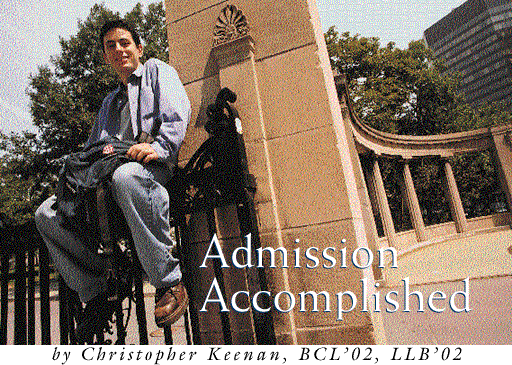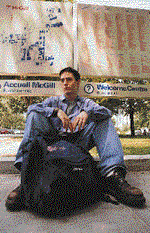
March has always been something of a paradox. It is a month which officially welcomes spring, brings luck to the Irish, but also reminds people to "Beware the Ides of March." It begins with the birthdate of Mars, the Roman god of war. It is only fitting, or perhaps ironic, that McGill University would set March 1st as its deadline for applications from CEGEP students seeking admission to an undergraduate program. As some students can attest, the admissions process can be a battle, and by the time February arrives (faster than usual in '98 thanks to the ice storm) the March 1st dreadline has taken on all the ominous overtones of a Friday the 13th.
A general application to one of McGill's undergraduate programs can be a very simple process. CEGEP students are asked to fill out three forms, provide a photocopy of their official high school transcript, a student copy of their CEGEP transcript, and a $60 cheque or money order. No sweat. However, many of the undergraduate programs have additional, faculty-specific requirements. For example, architecture/pre-architecture requires a bound, 8.5" x 11" portfolio with at least ten good-quality photocopies or photographs demonstrating the applicant's creative ability. The Faculty of Education requires a language proficiency test and/or interview, Physical and Occupational Therapy asks for a letter attesting to 50 hours of volunteer or paid therapeutic work in a health care facility, and the list goes on.
The process still seems simple enough, until one finds out that McGill's professional faculties handle their own admissions separately, with their own very specific and elaborate entrance requirements. McGill's law faculty, the oldest in Canada, requires students to submit both a general application form and a separate information document, to perform a language skills self-assessment test, to submit a personal statement, a resumé, a copy of their CEGEP transcript, and two letters of recommendation.
Tired yet? You might be after learning that scholarships are awarded by yet a different office. Applying for a scholarship requires a special resumé, a 200-word literary critique, a 500-word essay about the candidate's future, a photocopy of their CEGEP transcript and two reference letters. Those requiring additional financial assistance will be happy to learn that it, too, requires another form and substantiating documents.
The whole process can be quite intricate and it makes me wonder whether it is actually an unofficial IQ test the University uses as an admissions gauge. If students can navigate through the paperwork, raise the necessary funds, and deliver each form to the right place by the right time, then McGill can safely conclude the students are bright and resourceful.
But simply filling out the forms correctly and having good grades is no longer a guarantee of acceptance. The application guidelines clearly state that "admission is competitive, and students who present the minimum requirements are not necessarily guaranteed acceptance." In fact, for a growing number of reasons, many good students aren't accepted into their program of choice.
One of the major reasons is the high entering grades needed for McGill's more competitive programs, which hover around 80% for the Faculties of Science and Management. In September 1997, the ratio of applications to registrations was approximately 4:1 for Science and 6:1 for Management, figures which doubt-less include students who were accepted but opted for another program or university.
Another reason the admissions process is so competitive has to do with much broader trends in education. The 1996 Canadian Census revealed that the number of university graduates has nearly doubled since 1981. During the same period, the full-time attendance rate for young adults aged 20 to 24 also more than doubled, from 19% to 39%. While enrolment at McGill has tapered off in the last few years, the number of students enrolled full-time is markedly higher now than it was in the early '80s. This phenomenon is perhaps fostered by Montreal's high unemployment rate, which at 9.3% may be prompting some would-be workers to attend McGill in order to improve their long-term job prospects. And while quantity is a factor, so is the quality of entering students. Since the 1950s, the number of students entering McGill with previous university education has risen by more than 230%.
 Admission to McGill's law faculty is even more competitive than general undergraduate programs. McGill's Common Law program has the highest median entering grade for general admission students, for the class as a whole, and in general percentage (82.3%), among Canada's 16 common law schools. Admission to McGill's law faculty is even more competitive than general undergraduate programs. McGill's Common Law program has the highest median entering grade for general admission students, for the class as a whole, and in general percentage (82.3%), among Canada's 16 common law schools.
Why are so many students seeking admission to a faculty whose graduates are frequently the butt of bad jokes? If a thousand lawyers at the bottom of the sea is considered ... stop me if you've heard this one ... a good start (ba-dum-ching!), why did applications to the faculty rise so dramatically through the 1970s and '80s? The pervasive influence of American culture, fueled by the likes of novelist John Grisham and TV's L.A. Law, may have helped to create another perception. Dean of Law Stephen Toope, BCL'83, LLB'83, explains that "law became a more attractive, glamorous profession during the 1980s and at the same time, people began to realize that a legal education provided good intellectual training for other careers."
Toope also credits the establishment of the faculty's National Programme in 1968, which offers a degree in Civil Law and Common Law concurrently in a four-year program, with elevating the faculty from a local level to a national and international level.
Was it easier to be accepted before 1968? Former Dean of Law and current professor Yves-Marie Morissette believes it was. He has met many lawyers and judges who graduated from the program in the 1940s, '50s and '60s, and most like to joke that "back then, they would take everybody who applied." According to Morissette, "Older lawyers equate the legal education they received in the '50s with counting to 12; today's lawyers liken their training to nuclear physics. I think both are exaggerating slightly."
Since the number of CEGEP applicants admitted into professional faculties at McGill is very small, many of these faculties conduct interviews for short-listed applicants. The frantic dash for documents in February translates into a frenzied storm of speculation, which usually degenerates into stereotypical caricatures of different professionals. Law interview? Wear dark colours, don't smile. Med school? Wear glasses, look intellectual.
Should students really spend their time analyzing or worrying? "Not at all," counsels Marie-Claude Prémont, a law professor who has been a member of the faculty's Admissions Committee for the past three years. "The interviewer is looking to confirm that what is in the applicant's file is in fact borne out by the individual. The committee realizes that students are nervous and tries to make the process informal. Questions are not designed to throw candidates off, but rather, to allow candidates to demonstrate how they can think."
In short, students have nothing to worry about if they didn't lie in their application, are not overly formal, and can think under pressure (I know ... easier said than done).
When I was granted an interview, I went straight to the experts for advice. Vadney Haynes, MEd'78, a psychology teacher and psychotherapist, stresses the importance of the so-called "primacy effect" in any interview. "Make a good first impression," he cautions, "because most interview decisions, consciously or unconsciously, are made in the first four minutes."
Bryan Doubt, a theatre director/teacher who has conducted numerous interviews and prepared students for interviews at elite institutions like the National Theatre School, also conducts mock academic interviews for International Bacca-laureate students at Champlain College. The advice he offers is deceptively simple.
"Relax, breathe, and don't take anything personally. There are a number of reasons why an interview doesn't go well or why someone is refused and a lot of those reasons are beyond an applicant's control, something even as simple as the chemistry between interviewer and interviewee." Doubt advises students to learn from their interviews, because they will be faced with similar encounters many times throughout their lives.
Why is McGill so selective in its admissions procedures? Well, it could be trying to maintain its international reputation as Canada's Ivy League school. It is also possible that the University is looking to admit the next Stephen Leacock, or Wilder Penfield, or Ernest Rutherford, or... um ... William Shatner.
Or, administrators may be familiar with a study by Eliot Aronson and Judson Mills (1959), which showed that people who go through an unpleasant initiation to become part of a group like the group better than those who pay a smaller price in terms of time and effort. A bit of a stretch, perhaps, but it is a recurring theme at the University, dating as far back as 1932, when Sir Arthur Currie, Principal from 1920 to 1935, welcomed students with the following: "There are here riches untold for all who diligently seek, but they cannot be won without effort; and the greater the effort, the greater will be our recompense."
Great effort may be required even before being admitted to the University. Merely to be considered for admission to the Faculties of Management and Law, with a request for a scholarship, I had to send a total of $120, two resumés, five transcripts, six forms, four reference letters, and 2,681 words of essays.
The recompense Currie refers to explains why any sane student would brave the gauntlet of fees, forms, essays, letters, interviews, etc., to gain acceptance into McGill. For some, the reward may be monetary. In Montreal, for example, a university graduate out-earns someone without a degree by an average of $16,366. There are those for whom the satisfaction lies in the pursuit of knowledge, something for which Faust gave up his soul. But ultimately, perhaps the greatest reward of getting into McGill University is an intangible -- the international respect the institution has earned since its inception in 1821.
"A McGill University degree," asserts Dean Toope, "is a passport to the world. It is a degree that is recognized everywhere as a sign of academic strength."
|